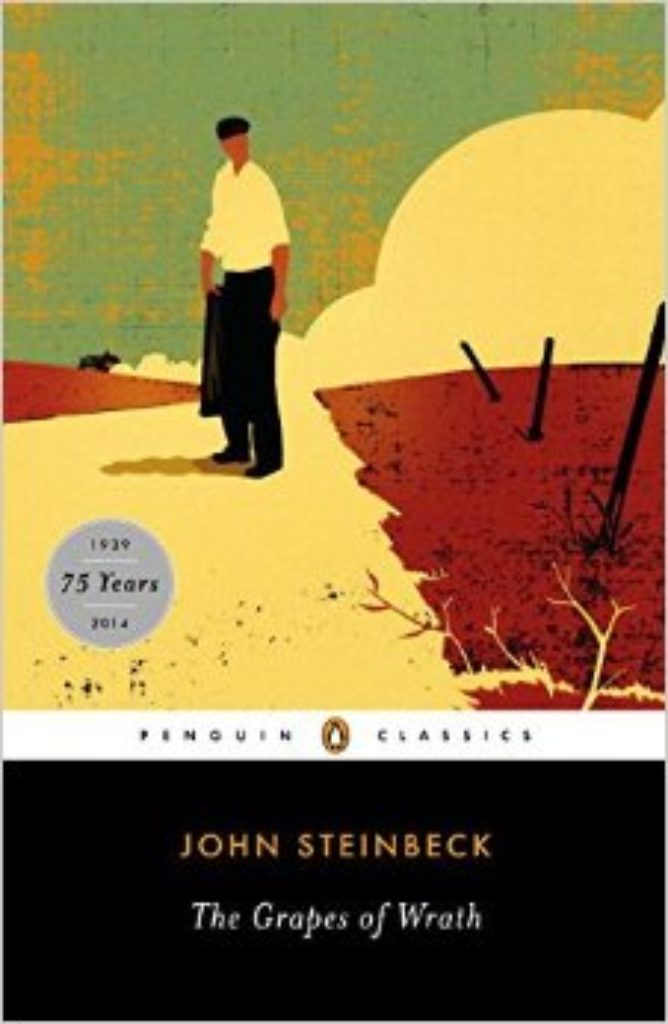This drama by John Steinbeck is published by Penguin Classics and is written for adults but is sometimes studied by high school classes.

This drama by John Steinbeck is published by Penguin Classics and is written for adults but is sometimes studied by high school classes.
Like many farmers living in the Dust Bowl during the Great Depression, the Joads lose their land and pursue the prospect of a better life in California. With all their possessions loaded in a beat-up truck, they cross the country, experiencing prejudice, poverty, car trouble and frustration. Once in the “Promised Land” of California, they discover thousands like them living in migrant camps, jobless or making pitiful wages. The Joads struggle to stay together, stay alive and maintain a sense of hope and dignity as loss, hunger and unemployment threaten to break their spirits.
Critics have written numerous essays on the biblical symbolism of this book, whose title derives from Revelation 14:19. The Joads (initially 12 of them, like the 12 tribes of Israel) and their companions parallel the downtrodden Hebrews plodding toward Canaan. Former preacher Jim Casy (see other belief systems) sacrifices his life for a cause and makes a “disciple” out of Tom, rendering Jim a Christ figure, despite his unconventional view of holiness. When Tom decides to follow Casy’s lead and aid his fellow man, he quotes Ecclesiastes 4:9-12. The Joads themselves are part of the “holiness” movement, but they use Christ’s name far more often as a curse word than in prayer.
Former preacher Jim Casy tells Tom how he baptized people against their will and took sexual advantage of women he’d just saved. He claims he’s no longer a preacher because he’s lost faith in traditional Christianity. He now believes the acts of simply living and caring for other people give birth to holiness. In the final scene, Rose of Sharon breastfeeds a dying man to save his life. (The nonsexual, nongraphic scene demonstrates the Joads’ respect for life and their fellow man and is meant to symbolize hope.)
The story begins with the traditional family structure of the day — men make the decisions while women remain silent. By the end, however, Ma has assumed authority over the family and Pa follows like a child. Uncle John, also once a respected family leader, insists that he has to get drunk one night despite the family’s desperate lack of money. The Joad kids pretend to be drunk and mimic him.
As a preacher, Casy abuses the trust of his followers. Later, as a strike leader, he dies for his beliefs. Banks, big businesses and legal authorities in the story all appear corrupt and self-interested.
Steinbeck employs numerous profanities, such as son-of-a-b–ch, d–n, h—, a– and b–tard. He freely uses the Lord’s name in vain. In a descriptive scene, a car hits and mangles the Joads’ dog (symbolic of the suffering that lies ahead for the family). A man bashes in Casy’s head, and Tom avenges Casy by brutally beating the man.
Tom and Casy engage in a number of crude sexual discussions. (One such conversation begins after the men have witnessed some dogs mating. The description is fairly graphic). Tom sometimes refers to prostitutes he has known, and Casy talks about “screwin’” girls when they were “full of the Sperit [sic].” Steinbeck suggests that Tom’s brother, Al, enjoys frequent sexual relationships with girls he meets in the camps, though he spares readers the details.
If your children have read this book or someone has read it to them, consider these discussion topics:
Do you see anything wrong with Casy’s definition of holiness?
Why did John Steinbeck end the book with Rose of Sharon breastfeeding a dying man?
What message was the author trying to send through the imagery?
Steinbeck seems to suggest that other people — not natural disasters, bad decisions or bad luck — are the primary cause of the Joads’ problems.
What do you think?
Is there any truth to this idea in our society?
What lessons can we learn from the Joad family’s hospitality and loyalty even in the face of extreme hardship?
Book reviews cover the content, themes and world-views of fiction books, not their literary merit, and equip parents to decide whether a book is appropriate for their children. A book’s inclusion does not constitute an endorsement by Focus on the Family.
You can request a review of a title you can’t find at [email protected].